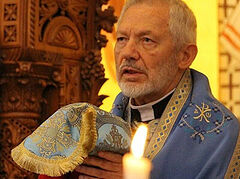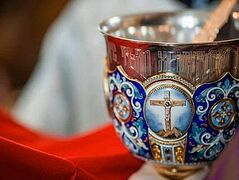“The problem is yours,” the official said. “You are the ones who are divided. Your people are making the complaints.”
Toronto, July 16, 2020
 Photo: giornaledimontesilvano.com
Photo: giornaledimontesilvano.com
On Sunday, July 5, the Greek Archdiocese of Canada announced a ban on Holy Communion in Toronto, following the city’s requirements that were based on the recommendation of the Chief Medical Officer of Health of Ontario.
It then became known that the Archdiocese’s decision was instigated by a local Greek organization known as the Greek Community of Toronto and local parishioners, who threatened to hold the Church liable for not following city guidelines.
Then, on Sunday, July 12, priests announced that they could commune the people with multiple single-use spoons, which was met by a strong negative reaction in some parishes.
On Tuesday, Metropolitan Sotirios of Toronto learned that Greek parishioners had reported their own parishes to government authorities again. If the situation continues, severe fines may be imposed and the churches may have to be closed again, the Metropolitan writes in “Coronavirus and Holy Communion: A Chronicle of Events,” published on the diocesan website.
Met. Sotirios begins by recalling that the churches were closed on March 17, 2020 by government order, and reopened on June 12. From June 12 to July 3, Holy Communion was served normally, “until one or more persons complained to the government authorities” that the Greek churches were using a common spoon “and that this practice would create serious health problems.”
Following this complaint, Met. Sotirios met with a group of priests and it was decided that on Sunday, July 5, the faithful were not to be communed during the Divine Liturgy. He then spoke with other religious leaders who affirmed that they were still giving Communion to the faithful, though with changes to how it was being dispensed.
Then, in an agreement with government authorities, it was decided that Holy Communion would be given in the Greek Churches with one spoon per communicant. “Most communities accepted these measures without serious reaction,” Met. Sotirios writes, though some “reacted and shouted” during the Liturgy.
Some Orthodox are now threatening to hold a rally outside the Archdiocese next Sunday, Met. Sotirios reports. Some of them are said to be followers of Elder Ephraim, though, “I cannot believe this, because Fr. Ephraim was peaceful and always cooperated with our Holy Archdiocese,” the Metropolitan states.
On Tuesday, Met. Sotirios received a call from the relevant government authorities concerning two churches that reportedly communed all the faithful with a single spoon. If this situation continues, “measures will be taken for all Greek Orthodox churches, fines will be imposed (fines reach up to ten millions $ 10,000,000 for organizations) and they may go as far as to close our churches again,” the Metropolitan writes.
Further, the government rep emphasized that they do not police churches, but only investigate when a report of violations comes in.
“The problem is yours,” the official said. “You are the ones who are divided. Your people are making the complaints.”
“You understand how sad this is,” Met. Sotirios writes. He assured the government official that separate spoons will be used from now on, until the end of the pandemic.
Regarding the shouts of “Sotirios of unworthy” that were heard in the video published by Romfea, Met. Sotirios responds that he is not sinless, but that he is suffering due to this situation. Must people always “throw stones” at the Archbishop, he wonders.
As for the rally planned at the Archdiocese on Sunday, it risks “presenting ourselves to all others as self-destructive, so willingly ready to inflict harm on each other,” and will only harm “Orthodoxy and Hellenism,” the Greek hierarch writes. It would be better to organize a meeting with the Metropolitan than to hold a rally, Met. Sotirios believes.
“I pray and I ask you to pray also that God helps us recover from this grave affliction of Covid-19. To restore peace to the world. To live peacefully as one Christian family, as befits true Christians,” Met. Sotirios concludes.




